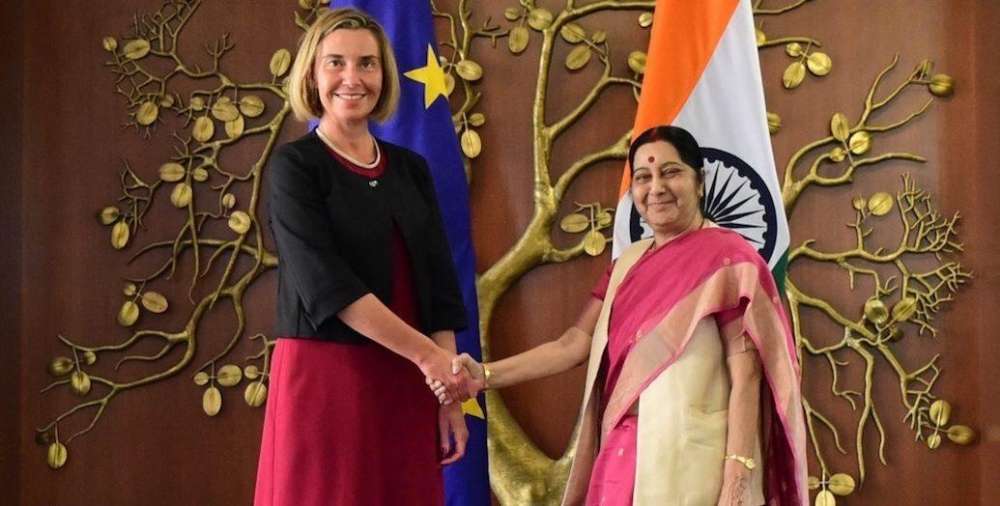Global Governance, Security, and Strategy in the EU-India Partnership

While traditionally focused on the economic and cultural domains, today the European Union and India are taking unprecedented steps to deepen the security dimension of their partnership. This attests to the evolution of their relationship, driven by a changing global environment, including possible US retrenchment and the rise of China.
Brussels’s new pragmatic pursuit of closer ties with India is a response to New Delhi’s increasing political and economic weight in Asia. India’s new interest in Europe, in turn, is motivated by the need to diversify options and balance Beijing by partnering with other middle powers. This Indo-European convergence of foreign policy interests throws open a window of opportunity for greater cooperation on strategic issues of security and global governance, marking a change of course after several years of either absent dialogue or deep disagreements.
After a burst of initiative in the early 2000s, with the first EU-India Summit and the launch of the “strategic partnership,” the relationship between the EU and India lost steam, facing several challenges – of which the failed negotiations towards a free trade agreement are only one example. While Brussels fixated on the need for climate change mitigation or enforcing 48-hour working weeks, New Delhi kept invoking its right to pollute the environment and disregard labor rights in the pursuit of economic growth. The limits to the partnership were evident in disagreements over the EU and India’s different approaches towards Myanmar and Sri Lanka. Moreover, the EU’s past indelicate handling of the Kashmir issue showed a lack of understanding of Indian sensitivities. India, primarily due to the limits of its bureaucratic capacities, never figured out the how to engage constructively with the EU on common areas of strategic interest. Outside of developmental and technical cooperation, the political and strategic partnership continued to stagnate. Cooling off of relations over India’s detention of two Italian marines further showed the tenuousness of the relationship.
Such difficulties and disagreements stalled progress on the partnership, with the annual EU-India Summit postponed for four consecutive years, since 2012. Prime Minister Modi’s visit to Brussels to attend the 13th EU-India Summit in March 2016 therefore marked an important turning point. European and Indian leaders expressed their commitment to give new momentum to the bilateral relationship by endorsing the EU-India Agenda for Action 2020 and adopting a joint declaration on counter-terrorism.
Since then, the EU and India have developed unprecedented efforts to share intelligence, consult on global and regional developments, pool their development assistance projects, and operate in triangulation with other actors. This opens up the possibility of working together on joint initiatives in a variety of areas, from peacekeeping and state-building to maritime and cyber security.
The new positive momentum is driven by several internal and geostrategic factors. First, the impact of the 2009 recession and Brexit nudged both sides into a franker engagement with each other. This led the EU to recognize the importance of India as an economic partner; consequently, the EU’s new Global Strategy pivots around “principled pragmatism” and underlines the “direct connection between European prosperity and Asian security.” Post-Brexit, India too no longer takes the EU for granted and recognizes that its own economic prospects depend on the continued growth and internal stability of its largest trading partner.
Second, turbulence in the Middle East (West Asia) is incentivizing greater EU-India security dialogue on their shared extended neighborhood, which stretches from Istanbul to Islamabad and from Moscow to Mauritius. This Eurasian arc of growing instability is of critical importance to Brussels and New Delhi’s aspirations to become net security providers and stabilize their peripheries. Whether on stemming refugee inflows, countering piracy and radicalization, supporting conflict resolution, or assisting in democratic transitions, the EU and India are on a converging path towards greater security cooperation in third countries.
Third, the formidable rise of China is swiftly altering the balance of power in the Eurasian heartland. Beijing has invested more than 50-billion euros into the EU since 2000 and developed new initiatives such as the “16+1” multilateral mechanism in Eastern Europe and the Belt and Road Initiative (BRI). In line with similar outreach efforts to Japan, Australia, and other “middle powers,” Delhi is therefore also reaching out to Brussels to diversify its options and counter-balance China’s European offensive. Similarly, the EU is also bound to realize the costs of excessive dependence on China and, conversely, focus on the potential returns of developing India as an alternative Asian partner.
Fourth, there is the growing realization that a shared commitment to democratic governance strengthens EU-India bilateral cooperation. India now recognizes the value of European expertise in developing regulatory standards and benchmarks in an open society with competing interests, the rule of law, and an assertive civil society. Prime Minister Modi’s efforts to expand state capacity and develop institutions that help India grow sustainably will benefit from the European experience, whether on cleaning the Ganga river, skilling youth, upgrading infrastructure, or modernizing the military.
Finally, the EU and India also have similar stakes in the liberal, multilateral order and to protect global commons cooperatively – from trade and the internet to nuclear non-proliferation and the freedom of navigation. In contrast with China, India’s foreign and security policies are therefore in harmony with the “vital interests” that underpin the Brussels’s external action, as defined in the EU’s Global Strategy: “peace and security, prosperity, democracy and a rules-based global order.” Beyond a mere leap of democratic faith, Brussels and New Delhi will have to focus on these cardinal principles to explore the current window of opportunity for greater EU-India convergence.
…







